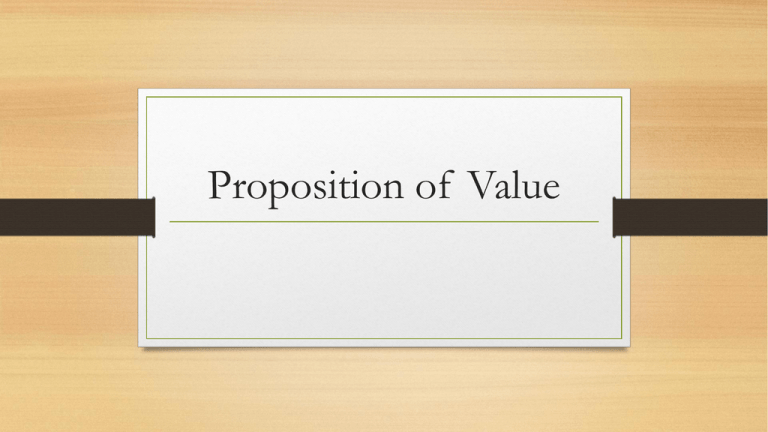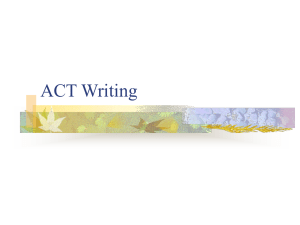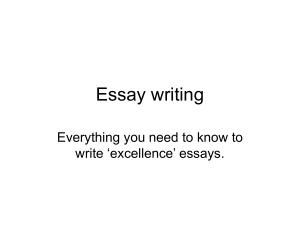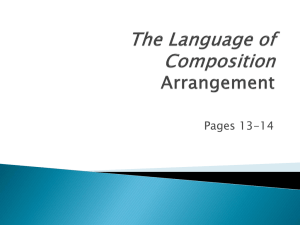
Proposition of Value
Claims - Types
1. Claim of Fact
2. Claim of Judgment
3. Claim of Policy
Claim of Value – Good/Bad
• Takes a more evaluative position. Judges whether something is
good/bad, right/wrong, just/unjust, ethical/non-ethical, etc.
• Claims of value appeal to standards of goodness, interest,
beauty, worth.
• Anytime a writer places value on someone or something as "the
best" or "superior," that writer is making a claim about value.
Defining Appeals to Value
1. Needs give rise to values
a. “If we feel the need to belong to a group, we learn to value
commitment, sacrifice, and sharing.”
2. Values differ within a society
a. Age, sex, race, ethnic background, social environment,
religion
Proposition of Value Essay
You are going to write a proposition of value essay that forwards which virtue
you claim to be most important.
Virtues – see list for all examples
• Patience
• Honesty
• Kindness
• Humility
• Assertiveness
• Honor
Pre-writing
SOAPSTone
•
•
•
•
•
•
Subject
Occasion
Audience
Purpose
Speaker
Tone
Pre-writing
Subject
• What is the subject of the text (the general topic, content, or ideas
contained in the text)?
• You chosen virtue is the subject of your essay.
Pre-writing
Occasion
• What is the rhetorical occasion (the time or place of the piece or
the current situation)? Is it a memory, a description, an
observation, a valedictory, an argument, a diatribe, an elegy, a
declaration, a critique, a journal entry, or . . . ?
• This is a proposition of value essay (argument).
Pre-writing
Audience
• Audience is a very important consideration in argument.
• Family - example
• It’s usually wise to think of your audience in an academic setting as someone
who is perfectly smart but who doesn’t necessarily agree with you.
• At the same time, do not think of your audience as clairvoyant. You have to
come out and state both your claim and your evidence clearly. Do not
assume that because the instructor knows the material, he or she understands
what part of it you are using, what you think about it, and why you have
taken the position you’ve chosen.
Pre-writing
Audience
•
•
•
•
What does your audience know or not know about your topic?
What is the education, background, and experience of your audience?
What do they have in common? Age? Interests? Ethnicity? Gender?
Do they know as much about your topic as you, or will you be introducing
them to new ideas?
• What attitudes, beliefs, opinions, or biases is your audience likely to hold?
• What might offend or alienate them?
• What tone do your readers expect you to take?
Pre-writing
Audience
• For this essay, your audience is me, Mr. Pesci, and your peers.
Pre-writing
Purpose
• What is the purpose for the essay (the reason for its
composition)?
• Your purpose in an argument essay is to persuade.
Purpose – To Persuade
Keep in Mind
• Incorporate the rhetorical strategies of ethos, pathos, and logos
• When arguing a point, using ethos, pathos, and logos can help convince your
audience to believe you and make your argument stronger. Ethos refers to an
appeal to your audience by establishing your authenticity and trustworthiness
as a speaker. If you employ pathos, you appeal to your audience’s emotions.
Using logos includes the support of evidence and logical argumentation. The
most effective speeches usually present a combination of these rhetorical
strategies.
The Rhetorical Triangle – Means of Persuasion
ETHOS/SPEAKER or WRITER
LOGOS/MESSAGE
PATHOS/AUDIENCE
Pre-writing
Speaker
• How can you establish credibility and authority in your essay?
Pre-writing
Tone
• Tone is whatever clarifies the author’s attitude toward the subject.
• What emotional sense will pervade your piece? How will you
choose diction to point to tone? How will your details, images,
language, and sentence structure convey your feelings?
Keep in Mind
• Get their attention, otherwise known as “The Hook”
• Think about how you can relate to the readers and get them to
relate to you or your topic. Appealing to your audience on a
personal level captures their attention and concern, increasing the
chances of a successful essay. Writers and speakers often begin
with anecdotes to hook their audience’s attention. For other
methods, see the list in your writing manual.
Essential Elements of Argument Writing
1.
2.
3.
4.
5.
6.
Claim(s)
Reasons
Evidence
Warrants
Counterargument
(Call to Action)
Essential Elements of Argument Writing
•
•
•
•
What do you think? • CLAIM
Why do you think that? • REASONS
How do you know that’s true? • EVIDENCE
Why do the reasons/evidence support the claim? •
WARRANTS
• What about alternative views or contrary evidence? •
COUNTERARGUMENT
Proposition of Value Essay
You are going to write a proposition of value essay that forwards which virtue
you claim to be most important.
Virtues – see list for all examples
• Patience
• Honesty
• Kindness
• Humility
• Assertiveness
• Honor
Thesis or Proposition
• Claim + Reasons
• You will propose which virtue is most valuable to you
and to society, and why it is the most beneficial.
Evidence
• Example – gives the reader a concrete illustration
• Contrasting example – gives the reader a concrete illustration of
what the concept does not include
Evidence - Requirements
Examples (2 required)
• Personal examples
• Observed examples
Researched Examples (2 required)
• Examples from history
• Examples from literature
• Examples from current events
Warrants
1. Virtually all claims, even those that appear to be purely factual,
contain expressed or unexpressed judgments (warrants)
2. Warrants – chain of reasoning that connects the reason and
evidence to the claim
a. It may be an assumption or belief that we take for granted
3. Warrants must be expressed for academic purposes
Warrants - Backing
• Extended Definitions
• Reference to Laws
• Explanations and Justifications of Rules/Common Knowledge
• We used common knowledge and “rules” to justify our claim of whether or not
Queenie was telling the truth.
Warrants – Extended Definitions
• Definition of concept + criteria = extended definition
• Criteria - a principle or standard by which something may be
judged or decided
Courage (concept)
• Aristotle identified courage as arguably the most important virtue.
• “Courage is the mother of all virtues because without it, you
cannot consistently perform the others.”
― Aristotle
Definition
• Courage - the ability to do something that frightens one;
strength in the face of pain or grief
Criteria
• 1. Aristotle defines courage or courageous action as the control of fear in the face of
significant danger, which may be physical, moral, or psychological. For an act to be labeled
courageous, a person must face threats that have serious consequences for the person's wellbeing.
• 2. Since courage is considered a virtue, a courageous act must be noble, not evil or malicious.
• 3. It must be deliberate, done with forethought and awareness of the dangers involved. The
act cannot be considered courageous if it is performed out of fear of a greater danger. In
that case, the act does not exhibit control of fear. It is done out of fear.
• 4. Someone whose performance is enhanced by training or equipment may not be
considered courageous because special equipment or training reduces the level of danger.
Extended Definition of Virtue
• Similar to Aristotle, you must define the criteria for your virtue.
This will be done in the introduction.
Counterargument
• Counterargument = acknowledgment of opposing view + refutation
Counterargument
• You can generate counterarguments by asking yourself how someone who disagrees
with you might respond to each of the points you’ve made or your position as a
whole.
• Once you have thought up some counterarguments, consider how you will respond
to them - will you concede that your opponent has a point but explain why your
audience should nonetheless accept your argument? Will you reject the
counterargument and explain why it is mistaken? Either way, you will want to leave
your reader with a sense that your argument is stronger than opposing arguments.
Counterargument
• When you are summarizing opposing arguments, be charitable. Present each
argument fairly and objectively, rather than trying to make it look foolish. You want
to show that you have seriously considered the many sides of the issue and that you
are not simply attacking or caricaturing your opponents.
• It is usually better to consider one or two serious counterarguments in some depth,
rather than to give a long but superficial list of many different counterarguments and
replies. Be sure that your reply is consistent with your original argument. If
considering a counterargument changes your position, you will need to go back and
revise your original argument accordingly.
Research - MLA
• You will research examples of your virtue in society to support
the reason(s) why your virtue is important to society.
Research
• PHS Library – books, databases, and more
• http://www.pennsbury.k12.pa.us/pennsbury/
• Internet
• Must fill out a Source Evaluation form
Research
Requirements
• Minimum of 3 sources/bibliography cards from the library’s
databases, other library resources, or the Internet
• See handout
• Minimum of 4 examples/note cards
• See handout on format
• See handout on content (paraphrasing, summarizing, quoting)
Essay
Requirements
• Minimum of 2 cited sources (the best of the 3)
• If you use an Internet source, you must fill out and attach a Source
Evaluation Form
• Minimum of 2 pieces of evidence/examples in paper (the best of
the 4)
Essay
In-text Citations
• In-text citations go at the end of the sentence and contain the author’s last name
and page number.
• For instance, a twelve -year old girl died from bone cancer because her
parents, who are followers of Christian Science, denied her medical treatment;
meanwhile the tumor on her leg grew to be forty inches in circumference. In
another case, an eleven- year old boy died of untreated diabetes; he was in a
diabetic coma and the practitioner or faith healer supervising him only
dispersed drops of water along his forehead while he suffered from vomiting,
facial spasms and uncontrollable urination (Swan).
Essay
In-text Citations
• If there is no author, then the title of the work goes in parentheses.
• Recently, “several medical and child advocacy groups have called for an end
to those legal exemptions for parents who practice faith healing, saying that
withholding medical care is a danger to children. According to one study, the
deaths of nearly 200 children between 1975 and 1995 are linked to religion
based denial of health care” (“Religion and Medicine”).
Essay
Works Cited
• Minimum of 2 entries
• If you use an Internet source, you must fill out and attach a Source Evaluation Form
• See sample
• http://www.pennsbury.k12.pa.us/pennsbury/PHS/Quick%20Links/Library/







